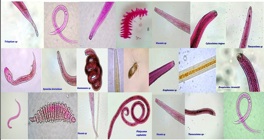Key words :
biodiversity,
conservation
,species
,habitat protection
,deep sea
,ecosystem collapse
,ecosystems
,invertebrates
,biosphère
,biodiversity
,environment
Deep-Sea Biodiversity Conservation Needed to Avoid Ecosystem Collapse
12 Feb, 2008 11:53 am
The exploration of the abysses of our planet is one of the last frontiers of ecological research. The dark portion of the biosphere likely hosts millions of undiscovered-yet new species. A global scale study conducted on biodiversity collected down to 8000 m depth reveals for the first time that small invertebrates (including worms and crustacea) play a key role in sustaining the overall functioning of these ecosystems. This study concludes that even a minor loss of biodiversity can cause a major impact on the functioning of the global biosphere. In the future, we should start protecting not only large ?flag species?, but also the almost invisible and sometime monstrous creatures that inhabit the abyss and the ocean interior.
Despite the deep-sea ecosystems are apparently far from us and difficult to reach and investigate there is an increasing evidence that they are susceptible to the direct and indirect impact of human activities. At the same time they help sustaining human life by providing essential goods and services (including food, biomass, bioactive molecules, oil, gas, minerals) and contribute to climate regulation, nutrient regeneration and supply to the upper ocean. The oxygen produced in the upper ocean, for instance, is about half of the total oxygen produced on Earth and largely depends on the availability of the nutrients regenerated in the deep-sea floor. Therefore, for their profound involvement in global biogeochemical and ecological processes deep seas are essential for the air, water and food we consume and consequently crucial for the sustainable functioning of our biosphere and for human wellbeing.

Composed figure: Diversity of the small life forms living on the abyssal seafloor (by Roberto Danovaro)
Deep-sea ecosystems are becoming a target for industries for exploiting the huge natural resources (trawling, drilling, dumping, oil, gas and mineral extraction) and are already being threatened by other pollution sources. These impacts might have important consequences on these highly vulnerable ecosystems determining biodiversity losses.
A study published on January 8th on Current Biology, a prestigious publication of Cell Press, provides for the first time evidence that the functioning of the deep-sea ecosystems depends on the richness of species living there. The researchers of a joint team collaborating within the frame of the project Hermes (Hotspot ecosystems along European Margins) and to the EU network of excellence MARBEF, found that the health and functioning of the deep-sea ecosystems are not only linked to biodiversity, but also increase exponentially with the increase of the diversity of species living there.
In this study, it was found that sites with a higher diversity of species support exponentially higher rates of ecosystem processes and an increased efficiency with which those processes are performed. Overall, these results suggest that a higher biodiversity can enhance the ability of deep-sea benthic systems to perform the key biological and biogeochemical processes that are crucial for their sustainable functioning.
This finding, which has no equivalents on terrestrial ecosystems, has an important consequence: the loss of deep-sea species poses a severe threat to the future of the oceans. In fact, a biodiversity loss by 20-25% is expected to reduce drastically (by 50%) the functions of these ecosystems, whilst a species loss by 50% could lead to ecosystem collapse.
The exponential increase in ecosystem function as species numbers rise indicates that individual species in the deep sea make way for more species, and facilitate each other life. “Facilitation” among species could be therefore the most efficient strategy to increase the ecological performance of the communities. Deep seas are the largest ecosystem on Earth, covering approximately 65% of the total surface. As such it is possible to conclude that facilitation could be the most common typology of interactions among life forms. There are several possible applications of this finding to other systems, and even to human societies, as “facilitation” could be the most convenient interaction for the overall wellbeing of the ecosystems and humans.
Overall the results of this study indicate that we need to preserve biodiversity, and especially deep-sea biodiversity, because otherwise the negative consequences could be unprecedented. In particular we must care also about species that are far from us and [essentially] invisible. To do this we must preserve deep-sea habitats of these life forms. An immediate policy action can be crucial for the sustainability of the functions of the largest ecosystems on the planet.
Reference:
Roberto Danovaro et al, Exponential Decline of Deep-Sea Ecosystem Functioning Linked to Benthic Biodiversity Loss, Current Biology, vol. 18, 8 January 2008. Abstract available here.
-
16/07/09
Global conservation priorities based on human need
-
08/06/09
Tropical forests worth more standing
-
25/11/08
The Island Rule: Made to be Broken?
-
03/10/08
Marine reserves and climate change: study finds no-take reserves do not increase reef resilience
-
26/09/08
The Rockefeller Foundation and climate change







This is an interesting report, but I also think it could be shorter, crisper and more tightly restricted to the key findings of the published research rather than the context. There are some minor inconsistencies in logic, in which the writer argues for the resource importance that arises from the exploitation of the deep ocean (in para 3), but also for the preservation of the deep sea habitats (last para).